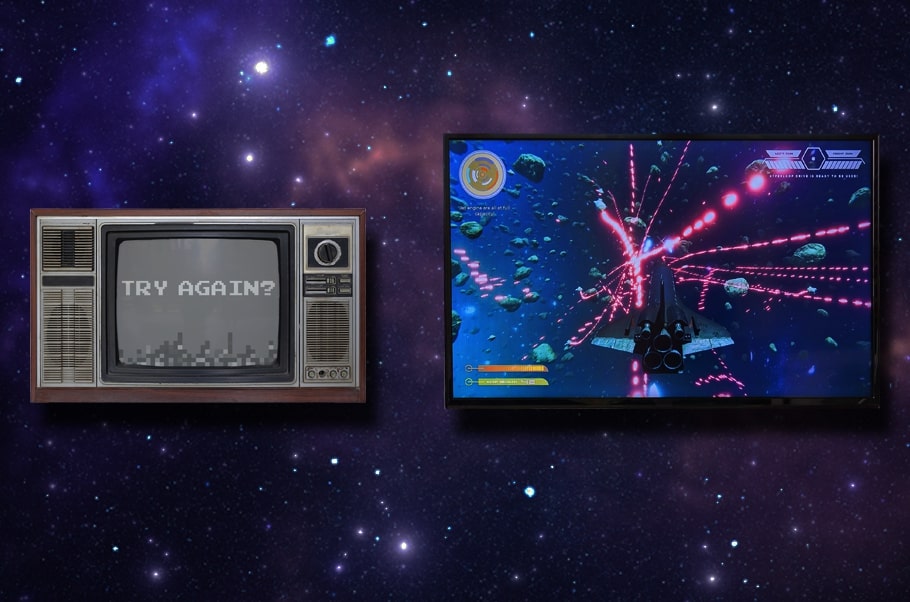The Pros and Cons of Discs vs. Downloads for Console Games
Discover what’s right for you.
These days, gamers have a lot of options at their fingertips, from myriad characters to emulate, to which systems to choose, to whether their quests will happen at home or via mobile devices. But there’s another big choice entering the gaming ecosystem lately and that’s whether to purchase game titles as traditional physical discs or as digital downloads.
Just as some music lovers want vinyl albums or CDs and others don’t, there are no clear-cut “winners” or “losers” here. Both discs and digital games cost about the same, and they provide a gaming experience and interface that is often identical. Yet while physical discs still represent most sales, more and more gamers (and gaming console manufacturers) are moving toward downloadable cloud-based offerings. In this article, we’ll take a look at the reasons why, along with the advantages and disadvantages of each format.
Discs: The Pros
For those who grew up pre-millennium, this is largely the standard. For those folks, owning something tangible is a priority, and discs or cartridges allow for this; in fact, there are many gamers who will only buy a digital game if they can’t find a physical one for sale. While it’s true that physical discs can be scratched or lost, that’s more a matter of the owner’s due diligence; cared for correctly, they will provide smooth gaming (essentially) forever. Digital games do not always offer this permanence (more on that shortly).
Unlike digital games, with a physical game, you can never be locked out. (See below.) Furthermore, if (heaven forbid) all the video game companies went out of business tomorrow, or if their servers went down, with physical games, you would still be able to play them on your consoles; digital games reliant on the internet or the cloud would be lost.
Another big plus: There are no subscriptions needed for physical games; they’re always yours. What’s more, unlike digital games, physical games have a resale value. This value can even rise above the original purchase price if the game becomes a collector’s item.
Last but not least, game discs or cartridges can be loaned or traded to other players. Digital games are non-transferable, though you can usually play them on any console you can sign into.
Discs: The Cons
The most obvious drawbacks to gaming from physical discs is that they are fragile (see above) and take up space. If you’re an avid gamer, you might own dozens — perhaps, even hundreds — of titles. These all need to go somewhere: on shelves, under a bed, in a closet or, worst of all (especially if you have a significant other), the middle of the living room. This can be a problem, especially in smaller living spaces. Digital games, of course, don’t have this drawback.
Here’s something you might find surprising, however: When it comes to gaming speed, there’s no appreciable difference between a digital or physical game. Loading times may differ, depending upon your console, but unless the game is being played interactively online and the player’s internet is slow, the actual gaming experience should be identical regardless of whether the data originated in a server or on a physical disc.
Downloads: The Pros
Digital games are convenient, plain and simple. With a few clicks of a button, you can purchase one on your console or handheld device and within a relatively short space of time (which might range from just minutes to a couple of hours at most), the game is ready to play in the comfort of your home. There is no car ride necessary, no big box store or salesperson to deal with, no delivery time to wait out for a package to arrive. Just point, click and play.
In addition, as noted above, digital games provide a way to own a great deal of media without having to worry about where to store it … or have a mountain of discs come crashing down on you!
Another huge benefit is that digital libraries never sell out. Many gamers from the ’80s and ’90s know the frustration of going to a brick-and-mortar store to buy that one perfect title, only to learn that the last one had just walked out the door. Digital games are never unavailable.
Digital games also make traveling with a library of titles much easier. Don’t want to pack hundreds or thousands of dollars worth of games in your checked bags? With a library of games stored on your hard drive, you’ll never face that dilemma. In the same way, digital games can never be lost by accident; they remain on a player’s account, essentially permanently.
Downloads: The Cons
Here’s where a pro turns into a con. The fact that digital games are bound to a player’s account means that, if for some reason a player is locked out of their account, access to the games is also denied. However, loss of access is rare and would likely only be the result of egregious behavior while playing online games or commenting vulgarly in online chats.
In addition, digital games are often only sold by subscription; let the subscription lapse, and your access to the game is gone forever … or at least until you scrape up the necessary bucks to renew it.
Digital games are like everything that’s on the internet: easily accessible but, in actuality, ephemeral. While your console is tangible, the game itself isn’t, which offers a sense of freedom … and, perhaps, a sense of absence, too. The choice is yours. Just bear in mind that there are advantages and disadvantages to both ways of entering the gaming Metaverse.















